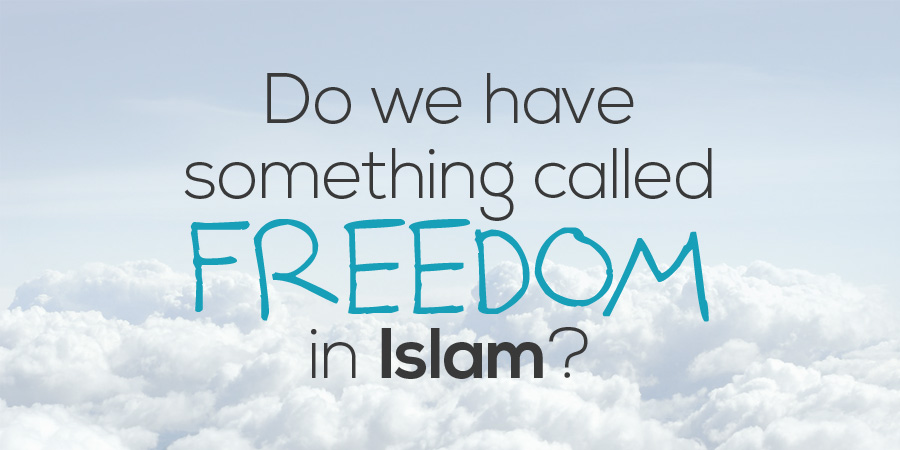
Expressing the above question through a different approach
Some say that considering the development and evolution in the various stages of human life as well as new beliefs, outlook, ways of thinking, and requisites of the present civilization, today’s religion should be concerned with human rights, and not duties and mandatory orders.
In reality, modernism and the modern civilization have created a tall wall between us and the past people who were servants and slaves serving others.
As such, modern man has wound up the case of acceptance of duty and responsibility which belonged to the age of barbarity and intransigence, and is striving to reclaim his rights. Nowadays, to talk about duty and discharging of responsibility is retrogression and a return to the pre-modern age. In this age of human rights, when by the blessings of democracy, man was released from the bondage of slavery and colonialism, the time has come for us to abandon the ancient religions which were consistent with the age of slavery and turn our attention to new religions that talk about human rights.
In a bid to realize their statement and objective and draw the attention of society, especially the youth, to such statements, the skeptics utilize various means. But we shall reply to them on the basis of correct and firm logic.
Reply to the above question
The claim that today’s man is only looking for his rights but not his duties is an idle and false claim. As legal philosophers say, “No right can be established for a person without there being a duty established for others. For example, if the right of using clean and fresh air is established for a citizen, other citizens are duty-bound not to pollute the air. So, if everybody has the right to pollute the air, the right to use clean air loses meaning.
Similarly, if a person has the right of possession to his properties, others must be obliged not to embezzle them; otherwise, the right to benefit from one’s possession will not be actually realized. In the same vein, every right established for a person has a corollary duty he has to discharge toward others. If a person has the right to benefit from public utilities as he really has, he is obliged in return to serve the society, accept duties and responsibilities, and not to burden others. Therefore, rights and duties—in both senses—are correlative and to say that people demand rights without responsibilities is inadmissible.
Considering that all religious and non-religious scholars as well as legal philosophers, in general, acknowledge the existence of duty and commitment, we conclude that what is meant by duty in the statements of the skeptics is divine duty. The essence of their statements is that God should not set any duties for us. On the contrary, according to them, social duties are not within the framework of rights that individuals possess because these duties are acceptable to all rational people. This confirms that the master-servant relationship, the master’s issuance of an order, and, the exigency of obeying him, are consistent with the culture of slavery and, therefore, irrelevant today.
Disobedience to God in the past
It is not only modern man who refuses to submit to God, religion and divine duty. Many people throughout history did not submit to divine duties but engaged in rebellion and violation of law. To say that man is looking for his rights and not duties is not new. In the very beginning Qabil (Cain), the rebellious son of Adam (‘a) openly disobeyed divine ordinances. His violation of law and selfishness led him to murder his own brother Habil (Abel):
(وَاتْلُ عَلَيْهِمْ نَبَأَ ابْنَيْ آدَمَ بِالْحَقِّ إِذْ قَرَّبَا قُرْبَانًا فَتُقُبِّلَ مِن أَحَدِهِمَا وَلَمْ يُتَقَبَّلَ مَنَ الآخَرِ قَالَ لَأَقْتُلَنَّكَ قَالَ إِنَّمَا يَتَقَبَّلُ اللّهُ مِنَ الْمُتَّقِينَ)
“Relate to them truly the account of Adam’s two sons. When the two of them offered an offering, it was accepted from one of them and not accepted from the other. [One of them] said, ‘Surely I will kill you.’ [The other one] said, ‘Allah accepts only from the God-wary’.”1
The historical accounts of the prophets of Allah (‘a) mentioned in the Qur’an indicate that most people used to belie their own prophet. Not only did they reject his prophetic call but also wrongly accused him. They used to ridicule and mock their own prophet and even kill or expel him from their city. If a prophet would say something beneficial for them by prohibiting them from doing wrong, for e.g., weighing wrongly—“And do not cheat the people of their goods”2—they would say to him in return:
(قَالُواْ يَا شُعَيْبُ أَصَلاَتُكَ تَأْمُرُكَ أَن نَتْرُكَ مَا يَعْبُدُ آبَاؤُنَا أَوْ أَن نَفْعَلَ فِي أَمْوَالِنَا مَا نَشَاء…)
“They said, ‘O Shu‘ayb (Jethro), does your worship require that we abandon what our fathers have been worshipping, or that we should not do with our means whatever we wish?… ’”3
It may possibly be said here that the opposition and hostility to the prophets and saints [awliya’] of Allah throughout history has been the result of idol-worship, polytheism and satanic rebellion. Our point is that man should neither wear the yoke of servitude to every object of worship [ma‘bud] nor follow the idols and Satan.
But this statement is unwise from the authentic viewpoint of revelation [wahy], because according to it, man is situated between two ways—servitude to God or servitude to the taghut4—and it is impossible not to choose one of them. If a person chants the slogan that “I am nobody’s servant,” in reality he is a servant of the taghut and his own carnal desires. As such, the Qur’an says:
(اللّهُ وَلِيُّ الَّذِينَ آمَنُواْ يُخْرِجُهُم مِّنَ الظُّلُمَاتِ إِلَى النُّوُرِ وَالَّذِينَ كَفَرُوا أَوْلِيَآؤُهُمُ الطَّاغُوتُ يُخْرِجُونَهُم مِّنَ النُّورِ إِلَى الظُّلُمَاتِ…)
“Allah is the Master of the faithful: He brings them out of darkness into light. As for the faithless, their patrons are the Rebels [taghut], who drive them out of light into darkness…”5
In another place, God says:
(أَلَمْ أَعْهَدْ إِلَيْكُمْ يَا بَنِي آدَمَ أَنْ لا تَعْبُدُوا الشَّيْطَانَ إِنَّهُ لَكُمْ عَدُوٌّ مُبِينٌ ٭ وَأَنْ اعْبُدُونِي هَذَا صِرَاطٌ مُّسْتَقِيمٌ)
“Did I not exhort you, O children of Adam, saying, ‘Do not worship Satan. He is indeed your manifest enemy. Worship Me. This is a straight path’?”6
The verse does not mean that after abandoning the worship of Satan, man is no longer in need of obeying and worshipping another being. In fact, he has to worship God. Just as in the formula of monotheism, “There is no god” [la ilaha] is followed by the phrase, “but Allah” [illallah]. Therefore, those who have woken up from the slumber of negligence by the light of revelation and have realized that they have to worship God for He is their real Creator and Master, in His hand is life and death, youth and old age, wellbeing and ailment. For them, to worship Him is the highest honor. His ordained duties stem from the spring of infinite wisdom and mercy, and acting upon them bring human felicity and perfection.
Realizing that refusal to accept the truth, duty and responsibility are caused by man’s lack of nurture [tarbiyyah], bestiality and following of Satan, and have always existed in history and not only found in modern man. In fact, it is modern man who has desisted from the essentials of civility and turned toward the age of ignorance and savagery, and become the intransigent. On the contrary, those who have been trained in the school [maktab] of the prophets (‘a) have desisted from bestiality and savagery and have chosen civility through the rule of law and acceptance of duty and responsibility in the true sense of the word.
Civilization and civility are the opposite of savagery and their main requisite and condition is the recognition of law. Therefore, how can some people say that modern civilization demands that man should not accept any duty?! Is this civility, or savagery? Basically civilization is based on the acceptance at limitation, law and assuming responsibility; otherwise it has no difference with savagery.
Thus, he who refuses to accept the law, duty and responsibility actually advocates a return to savagery and barbarism. Certainly, he who has such an idea and disposition can never be the saintly vicegerent of Allah, who is our model.
Muhammad Taqi Misbah Yazdi Written by
Mansoor L. Limba Translated by
References:
- Surah al-Ma’idah 5:27.
- Surah ash-Shu‘ara’ 26:138.
- Surah Hud 11:87.
- The term taghut applies to any idol, object, or individual that prevents men from doing what is good, and leads them astray. The term has been used eight times in the Qur’an. Prior to Islam, taghut had been the name of one of the idols of the Quraysh tribe. This name is used also to mean Satan. Moreover, the term is used to indicate one who rebels against lofty values, or who surpasses all bounds in his despotism and tyranny and claims the prerogatives of divinity for himself whether explicitly or implicitly. [Trans.]
- Surah al-Baqarah 2:257.
- Surah Ya-Sin 36:60-61.
 Question: I know well that lying is one of the vices, but I practice it easily in small or great situations. I do not know how to get rid of it. Please guide me, may Allah reward you with good!
Question: I know well that lying is one of the vices, but I practice it easily in small or great situations. I do not know how to get rid of it. Please guide me, may Allah reward you with good!




